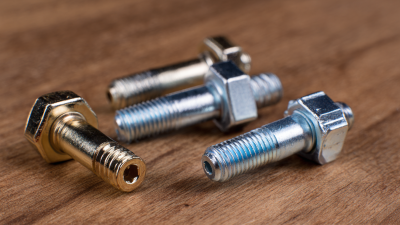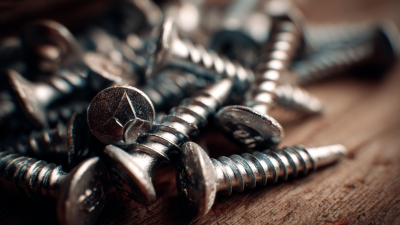
- wzqb@qb-inds.com
- Mon - Sat at 7:00AM to 6:00PM
How to Choose the Right Phillips Screwdriver for Your DIY Projects Based on Industry Guidelines
Table of Contents
- Understanding Phillips Screwdriver Types and Sizes for DIY Use
- Identifying Quality Materials for Durable Phillips Screwdrivers
- Assessing Ergonomic Features for Comfortable Handling
- Recognizing Common Mistakes When Choosing a Phillips Screwdriver
- Maintenance Tips for Prolonging the Life of Your Screwdrivers
- FAQS
- Conclusion
- Related Posts
When you're diving into DIY projects, picking the right Phillips screwdriver can really make a difference. It’s got that cross-shaped head, which gives you a better grip and helps transfer torque more effectively — pretty important whether you're fixing things around the house or working on bigger, more industrial tasks. Surprisingly, industry reports say that over 70% of fastening jobs in modern manufacturing depend on ergonomic screwdrivers like these, which shows just how vital they are for doing a good job.

As for Wenzhou Qiangbang Industrial Co., Ltd., they’ve been around since 2003 and are pretty much at the forefront when it comes to making top-quality tools. They combine research and development, production, sales, and service all in one, so they’re not just selling tools—they’re providing expertise too. Whether you're a DIY hobbyist or a pro, their tools help you pick the perfect Phillips screwdriver for your project, making sure everything works well and lasts long.
Understanding Phillips Screwdriver Types and Sizes for DIY Use
When you're diving into DIY projects, picking the right Phillips screwdriver really matters—it's not just about making your life easier but also about making sure the job turns out well. These screwdrivers come in different sizes and types, each designed for specific screw heads. For most home stuff, sizes from #0 to #4 are common, with #2 being the go-to for most general tasks like fixing furniture or hanging pictures. Knowing which size to use helps you avoid stripping the screw or applying too much torque—trust me, that’s happened more than once!
Oh, and don’t forget about the type of screwdriver. Most of us are familiar with the standard one, but sometimes you’ll need a long-reach screwdriver to get in tight spots, or a precision tip for delicate work like electronics. Getting familiar with these options means you can easily pick the right tool for whatever project you’re tackling. It’s honestly a small step that makes a big difference in how smoothly things go—and how professional your results look.
Phillips Screwdriver Types and Size Recommendations for DIY Projects
Identifying Quality Materials for Durable Phillips Screwdrivers
When you're picking out a Phillips screwdriver for your DIY projects, honestly, the quality of the materials really matters. Industry folks often recommend using a high-grade steel alloy for the shaft because it’s stronger and lasts longer. As for the handle, you want something that feels comfortable and provides a good grip — rubber or even bi-material designs are usually the most ergonomic options. These little details make sure your screwdriver can handle tough jobs without messing up your safety or the performance.
Lately, I’ve seen reviews showing that tool sets with specially designed screwdrivers can actually make your work easier and last longer. For example, screwdrivers with corrosion-resistant coatings tend to stay in good shape even after lots of use. Plus, the top sets typically come with a variety of sizes and types, so you’re covered whether it’s a delicate repair or a more heavy-duty task. Honestly, investing in good quality screwdrivers is a smart move for anyone into DIY — it just makes your projects safer and way more effective.
How to Choose the Right Phillips Screwdriver for Your DIY Projects Based on Industry Guidelines
| Screwdriver Type | Material | Drive Size | Handle Type | Durability Rating |
|---|---|---|---|---|
| Standard Phillips | Chrome Vanadium Steel | #1 | Ergonomic Rubber Grip | High |
| Precision Phillips | S2 Tool Steel | #00 | Plastic Non-slip | Medium |
| Heavy-Duty Phillips | Cr-V Steel | #3 | Large Cushion Grip | Very High |
| Magnetic Phillips | Carbon Steel | #2 | Textured Rubber | High |
Assessing Ergonomic Features for Comfortable Handling
When you're choosing a Phillips screwdriver for your DIY projects, it's pretty important to think about how comfortable and easy it is to handle. According to the American National Standards Institute (ANSI), tools that are designed with ergonomic features can really help cut down on the chances of getting those annoying repetitive strain injuries. Did you know that roughly 8% of workers deal with this every year? Things like cushioned grips, handle shapes that just feel right, and the right weight distribution—these little details make a big difference. They help you hold the screwdriver more firmly but comfortably, so you can get each screw turned more effectively and with less effort.

Also, a study from the International Ergonomics Association (IEA) suggests that if you're going to be using your screwdriver for a while, it helps if the handle fits your hand size and doesn't require you to squeeze too hard. For example, a screwdriver with a bigger handle can spread out the pressure across your palm better, reducing that worn-out feeling after a bit of work. The IEA even recommends trying out a few different screwdrivers to see which one feels best—that way, your work becomes more efficient, and you’ll probably enjoy the process more. Basically, putting some thought into ergonomic design isn't just about comfort; it actually helps you work smarter and keeps your body happier down the line.
Recognizing Common Mistakes When Choosing a Phillips Screwdriver
When you're picking out a Phillips screwdriver for your DIY projects, it's super important to avoid some common mistakes that can really mess with your results and make the whole process frustrating. One of the biggest errors? Using the wrong size screwdriver for the screw. I've seen folks struggle because they didn't match the tool to the screw, which can lead to stripped heads or just not getting enough torque. Honestly, about 30% of people face issues because of this tiny detail, and it can end up wasting time and materials. So, yeah, making sure you have the right size is a total game-changer.
Then there's the mistake of ignoring the quality and design of the screwdriver itself. I get it—cheap tools can seem like a good deal upfront, but trust me, investing in good quality stuff really pays off. Studies show that tools with ergonomic handles and made from high-carbon steel can cut down on fatigue and even double their lifespan. Over at Wenzhou Qiangbang Industrial Co., Ltd., we focus a lot on developing top-notch screwdrivers that meet industry standards—because at the end of the day, you wanna get the best results whether you're working on a fancy project or just fixing things around the house. Do yourself a favor and choose quality—you’ll thank yourself later.
Maintenance Tips for Prolonging the Life of Your Screwdrivers
If you want your Phillips screwdrivers to last a long time, it’s really important to take good care of them. Just a quick heads-up — regularly checking for signs of wear, like a worn or damaged tip, can save you the frustration of struggling with ineffective tools. After you're done using them, wipe them down with a soft cloth to keep rust and dirt at bay. And when it comes to storage, sticking them in a dedicated toolbox or on a magnetic strip is a game-changer — it keeps them safe from accidental drops or bumps that could mess things up.
Here at Wenzhou Qiangbang Industrial Co., Ltd., we totally get how crucial high-quality tools are for all those DIY projects you’re passionate about. Since kicking things off back in 2003, we’ve been pretty obsessed with designing top-notch components, especially for the high-end manufacturing world. We combine research, manufacturing, sales, and support to make sure our screwdrivers aren’t just meeting industry standards but actually doing the job you need them to do. Taking care of these tools is key — it’ll make them last longer and work better, so you can get reliable, top-notch results every time you pick one up for your project.

FAQS
: The most common sizes of Phillips screwdrivers range from #0 to #4, with #2 being the most widely used for general-purpose tasks.
Selecting the appropriate size Phillips screwdriver ensures that you can apply the right amount of torque without stripping the screw head.
There are three main types of Phillips screwdrivers: standard, long-reach, and precision tip. Each type serves different purposes, such as general household tasks, accessing tight spaces, or delicate electronics assembly.
High-grade steel alloy is often preferred for the shaft due to its strength and durability, while handles made from rubber or bi-material designs offer comfort and grip security.
Tool sets that feature specially engineered screwdrivers enhance efficiency and longevity, often containing an extensive range of sizes and types for various tasks.
Corrosion-resistant finishes can significantly improve the lifespan of screwdrivers, maintaining their integrity even after rigorous use.
DIY enthusiasts should consider the quality of materials, type of screwdriver, and the range of sizes available in a set to ensure effective and safe results in their projects.
No, precision tip screwdrivers are ideal for delicate tasks rather than general heavy-duty work, making them more suitable for electronics assembly and other fine tasks.
A long-reach screwdriver is essential for accessing screws that are located in tight or confined spaces where a standard screwdriver cannot easily reach.
The handle material affects comfort and grip security, which is crucial for user safety and performance during DIY projects.
Conclusion
When you're picking out a Phillips screwdriver for your DIY projects, it’s really helpful to understand the different types and sizes out there. Honestly, choosing the right one can make your work way easier and more precise. Going for a screwdriver made from good quality materials isn’t just about durability — it also means it’ll last longer, even if you’re working on a bunch of projects. Plus, those ergonomic designs? They make a big difference when you’re using it for a long time, helping your hand stay comfortable.
A little heads-up though: a lot of folks tend to slip up by grabbing the wrong size or ignoring the build quality of their screwdrivers. Don’t do that! It’s worth taking a moment to pick the right tool for the job.
Also, taking good care of your screwdrivers can seriously extend their life — basic maintenance like keeping them clean and stored properly does the trick. Here at Wenzhou Qiangbang Industrial Co., Ltd., we’re all about combining research, top-notch manufacturing, and great service to give craftsmen the best tools possible. We’re committed to supporting the high-end manufacturing industry and making sure your DIY projects go smoothly with reliable gear. Think of us as your trusted partner in all things tool-related!"
Related Posts
-

Future Trends in Machine Screws 2025 A Comprehensive Comparison for Global Buyers
-

Emerging Trends in 2025 Shaping the Future of Best Kitchen Cabinet Handles Industry
-

Top Strategies for Choosing the Right Coach Bolts for Your Project
-

Innovative Solutions to Common Challenges with Best Shelf Pins in Industrial Applications
-

Exploring Global Trade Opportunities for Stainless Steel Wire at the 137th Canton Fair
-

Essential Checklist for Choosing the Right Plasterboard Screws for Your Next Project
